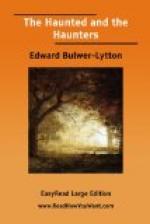The haunting apparitions are not all of earth. Cornelius Agrippa, in his book of the Secret Doctrine, shows that they are astral too. The familiar spirits of Mars, in his account, are no lovelier than Macbeth’s witches:—“They appear in a tall body, cholerick, a filthy countenance, of colour brown, swarthy or red, having horns, like Harts’ Horns, and gryphon’s claws, and bellowing like wild Bulls.”
But the spirits of Mercury are delightful. They indeed are “of colour clear and bright, like unto a knight armed,—and the motion of them is as it were silver-coloured clouds.” So, if Mars has troubled the world, as in the unhappy history of our own time, we must hope for the brighter forms, and the remedial and aerial messengers of Mercury.
We may seem to have strayed from the proper boundaries in going so far. But it is one of the offices of this book to widen the area of research, and relate the ghost-story anew to the whole literature of wonder and imagination. Such sagas as that which Dr Douglas Hyde has translated with consummate art from the Irish, “Teig O’Kane and the Corpse,” which Mr W.B. Yeats called a little masterpiece; or Boccaccio’s story of the spectre-hounds that pulled down the daughter of Anastasio, or Scott’s “Wandering Willie’s Tale,” or Hawker’s “Cruel Coppinger,” or Edgar Poe’s “Fall of the House of Usher,” are of their kind not to be beaten. And in their own way some of the later records are as telling. One can take the book as a text-book of the supernatural, or as a story-book of that middle world which has given us the ghosts that Homer and Shakespeare conjured up.
ERNEST RHYS.
I
GHOST STORIES FROM LITERARY SOURCES
I
THE FALL OF THE HOUSE OF USHER
By EDGAR ALLAN POE
Son coeur est un luth suspendu;
Sitot qu’on le touche
il resonne.
DE BERANGER.
During the whole of a dull, dark, and soundless day in the autumn of the year, when the clouds hung oppressively low in the heavens, I had been passing alone, on horseback, through a singularly dreary tract of country; and at length found myself, as the shades of the evening drew on, within view of the melancholy House of Usher. I know not how it was—but, with the first glimpse of the building, a sense of insufferable gloom pervaded my spirit. I say insufferable; for the feeling was unrelieved by any of that half-pleasurable, because poetic, sentiment with which the mind usually receives even the sternest natural images of the desolate or terrible. I looked upon the scene before me—upon the mere house, and the simple landscape features of the domain—upon the bleak walls—upon the vacant eye-like windows—upon a few rank sedges—and upon a few white trunks of decayed trees—with an utter depression of soul which I can compare to no earthly sensation




